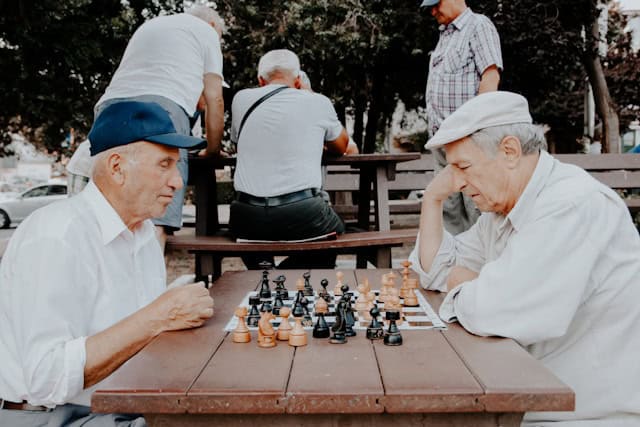Did you know that June is National Elder Abuse Prevention Month? Today on the blog we’re going to look at ways to combat social isolation, a big risk factor for elder abuse.
We’ve all felt lonely, especially since Covid-19. What’s the difference between loneliness and isolation? The Centers for Disease Control define loneliness as “the feeling of being along, regardless of the amount of social contact;” they define isolation as the “lack of social connections.” While someone may have a social network and still feel lonely, they are considered isolated if they do not have any social network. About 25% of older adults (age 65+) are socially isolated. Isolation can have negative effects on the body, such as an increased risk of dementia, higher rates of depression, anxiety, and suicide, and even premature death. So how can we stay social as we age? Where can we go to potentially find new connections?
Community Resources
- Connected Companions (734) 998-9353
- Retired and Senior Volunteer Program (RSVP) (734) 971-9781, Ext. 377
- Senior Resource Connect publishes a printed and online senior resource directory including resources such as transportation, education, social opportunities, and more.
- WISE Comfort Line (734) 769-0209
Education
- Ann Arbor Community Education and Recreation (734) 994-2300
- Chelsea Community Education & Recreation (734) 433-2208
- Dexter Community Education (734) 424-4180
- Elderwise (734) 340-4691
- GetSetUp
- Milan Adult & Community Education (734) 439-5050
- Osher Lifelong Learning Institute (OLLI) (734) 998-9351
- Pittsfield Township Parks & Recreation (734) 822-2120
- Saline Community Education (734) 401-4020
- Senior Planet (888) 713-3495
- Washtenaw Community College Emeritus Scholarship Program (734) 973-3543
- Washtenaw Community College Senior Focus Classes (see website for list of class locations)
- Whitmore Lake Community Recreation (734) 449-4461, Ext. 3057
Gardening Clubs
- Ann Arbor Garden Club ($20 annual dues)
- Ann Arbor Good Thyme Garden Club ($20 annual dues)
- Ann Arbor Wild Ones (various membership levels)
- Chelsea Area Garden Club ($25 annual dues)
- Dexter Garden Club ($25 annual dues)
- Milan Garden Club ($20 annual dues)
- Saline Stone & Thistle Garden Club (email [email protected] for current due amounts)
Senior Centers
- Ann Arbor Senior Center (734) 794-6250
- Chelsea Senior Center (734) 475-9242
- Dexter Senior Center (734) 426-7737
- Lincoln Golden Ages (734) 483-8366
- Manchester Area Senior Citizens Council (517) 262-7828 (Check the latest issue of the Manchester Trumpeter for up-to-date information)
- Milan Seniors For Healthy Living (734) 508-6229
- Northfield Township Community/Senior Center (734) 449-2295
- Pittsfield Township Senior Center (734) 822-2120
- Saline Area Senior Center (734) 429-9274
- Turner Senior Wellness Program (734) 998-9353
- Well Connected/Senior Center Without Walls (877) 797-7299
- Ypsilanti Senior Center (734) 483-5014
- Ypsi Township 50 & Beyond Program (734) 544-3838
Senior Lunch Cafes
- Chelsea Senior Center (734) 475-9242. M-F @ noon. Call 24 hours in advance to reserve lunch.
- Dexter Senior Center (734) 426-7737. M, W, Th @ noon. Call 48 hours in advance to reserve lunch.
- Manchester Area Senior Citizens Council (517) 262-7828. T & Th @ noon. Call by 7am the week prior to reserve lunch.
- Northfield Township Community/Senior Center (734) 449-2295. M, W, F @ noon. Call 1 week in advance to reserve lunch.
- Turner Senior Wellness Program (734) 998-9353. T, F @ noon. Call 48 hours in advance to reserve lunch.
- WISE @ the J . M, W, F @ noon (12:30pm on Mondays). Visit the website or email [email protected] to reserve lunch.
- Ypsilanti Senior Center (734) 483-5014. M-F @ 11:45am. Call 1 week in advance to reserve lunch.
- Ypsi Township 50 & Beyond Program (734) 544-3838. M-F @ 11am. Call 1 week in advance to reserve lunch.
Libraries
- Chelsea District Library (734) 475-8732
- Reading Glasses Book Club (meets 1st Tuesday of each month 6:00-7:00pm @ Chelsea Alehouse)
- Books & Banter Book Club (meets 1st Thursday of each month 2:00-3:00pm)
- Milan Public Library (734) 439-1240
- Lethal Lunches (Mystery Book Group- meets 1st Wednesday of each month 1:00-2:30pm)
- Northfield Township Area Library (734) 449-0066
- Finer Things Book Club (meets 2nd Tuesday of each month 1:00-2:00pm)
- Monthly craft events
- Saline District Library (734) 429-5450
- Walking Yoga (Mondays Noon-1:00pm)
- Renovation Yoga (Thursdays Noon-1:00pm)
- Monthly Bee-ngo (bingo)
- Monthly adult coloring
- Monthly craft events
- Ypsilanti District Library (734) 482-4110
- Mahjong (Mondays 1:00-3:00pm)
- Moving For Better Balance with the Ann Arbor YMCA (Wednesdays 10:00-11:00am)
- LNGO Fitness (Thursdays Noon-1:00pm)
- Chair Yoga (Fridays 10:30-11:30am)
- Walking Club (Fridays 10:30-11:30am)
- Senior Advisory Board (meets 3rd Thursday of each month 1:00-2:00pm)
- Monthly craft events
Memory Care
National Resources
- AARP Friendly Voice– Call 1-888-281-0145 and leave a voicemail. AARP staff will return your call. Please note that when AARP calls your caller ID may say “800 Service.”
- To speak in Spanish call 1-888-497-4108
- AARP Local– Click on “Change City” near the top of the page to find classes and social events near you.
- AmeriCorps Seniors (volunteer opportunities)
- Red Hat Society (Note: there is an annual membership fee of $35)
- SAGE Connect– LGBTQ-Friendly weekly caller program. The program currently has a waitlist. Email [email protected] for more information.






